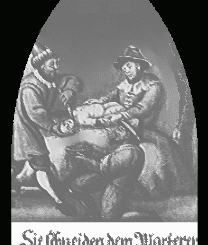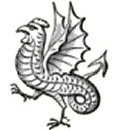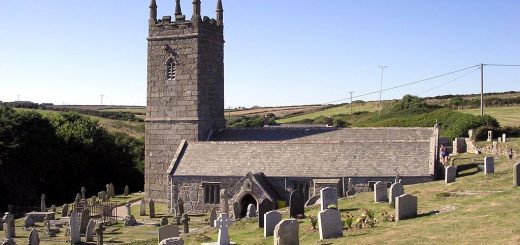Whistling Dobhar-chú of Lough Glenade
In Conbnaíl (Conwell) Cemetery, Drummans, there is a tombstone depicting a carved Dobhar-chú .The grave is that of Grace Connolly (Grainne Ni Conalai), who apparently was killed by a Dobhar-chú from Lough Glenade on 24th September 1722. The tale of her death has like all good stories been altered slightly through the retelling, but I will try to make reference to as many versions as I can. Grace was down by the shore of Lough Glenade (Lake Glenade) either washing clothes or bathing, when she was attacked and killed by a Dobhar-chú. In one version her husband went looking for her as she had been away longer than usual and found her mutilated body lying by the shore with the Dobhar-chú asleep on top of her breasts. In another version of the story, he hears her screams and arrives to find the Dobhar-chú sat upon her corpse and feasting upon it.
 Her husband named Traolach McLoghlin (or McGloughlan or McLaughlin or Mac Lochlainn) managed to sneak upon and kill the creature with a knife or sword, but as the Dobhar-chú was dying it let out a whistle which summoned its mate from the waters of Lough Glenade. Again in one version of the story as the second Dobhar-chú came toward shore McLoghlin shot it dead with a gun, however, in other versions he realises that he cannot win a straight fight with a large Dobhar-chú and flees on horseback with another man (sometimes his brother).
Her husband named Traolach McLoghlin (or McGloughlan or McLaughlin or Mac Lochlainn) managed to sneak upon and kill the creature with a knife or sword, but as the Dobhar-chú was dying it let out a whistle which summoned its mate from the waters of Lough Glenade. Again in one version of the story as the second Dobhar-chú came toward shore McLoghlin shot it dead with a gun, however, in other versions he realises that he cannot win a straight fight with a large Dobhar-chú and flees on horseback with another man (sometimes his brother).
The Dobhar-chú came straight out of the lake and chased the pair over field and fence, determined to take vengeance on the man that killed its mate. After a long chase in which the mounted men continually failed to shake the beast, they were forced to stop. One version has them stopping at blacksmiths. The Dobhar-chú catches up and either dives under the mount of McLoghlin or dives through his horse, tearing its way into the animal and out the other side. In either version, when the Dobhar-chú emerges on the other side of the horse, McLoghlin is waiting with a sword or other blade and decapitates it.
The horse and creature were buried near Cashelgarron fort beside Benbulben, which is close to where the final fight was said to take place.
A version of this tale is recounted in the following poem by a contemporary but unknown author.
‘By Glenade lake tradition tells, two hundred years ago
A thrilling scene enacted was to which, as years unflow,
Old men and women still relate, and while relating dread,
Some demon of its kind may yet be found within its bed.
It happened one McGloughlan lived close by the neighbouring shore,
A lovely spot, where fairies oft in rivalry wandered o’er,
A beauteous dell where prince and chief oft met in revelry
With Frenchmen bold and warriors old to hunt the wild boar, free.
He and his wife, Grace Connolly, lived there unknown to fame,
There, years in peace, until one day from out the lakes there came
What brought a change in all their home and prospects too.
The water fiend, the enchanted being, the dreaded Dobharchú.
It was on a bright September morn, the sun scarce mountain high,
No chill or damp was in the air, all nature seemed to vie
As if to render homage proud the cloudless sky above;
A day for mortals to discourse in luxury and love.
And whilst this gorgeous way of life in beauty did abound,
From out the vastness of the lake stole forth the water hound,
And seized for victim her who shared McGloughlan’s bed and board;
His loving wife, his more than life, whom almost he adored.
She, having gone to bathe, it seems, within the water clear,
And not having returned when she might, her husband, fraught with fear,
Hasting to where he her might find, when oh, to his surprise,
Her mangled form, still bleeding warm, lay stretched before his eyes.
Upon her bosom, snow white once, but now besmeared with gore,
The Dobharchú reposing was, his surfeiting being o’er.
Her bowels and entrails all around tinged with a reddish hue:
‘Oh, God’, he cried, ’tis hard to bear but what am I to do?’
He prayed for strength, the fiend lay still, he tottered like a child,
The blood of life within his veins surged rapidly and wild.
One long lost glance at her he loved, then fast his footstps turned
To home, while all his pent up rage and passion fiercely burned.
He reached his house, he grasped his gun, which clenched with nerves of steel,
He backwards sped, upraising his arm and then one piercing, dying, squeal
Was heard upon the balmy air. But hark! What’s that that came
One moment next from out of its depth as if revenge to claim!
The comrade of the dying fiend with whistles long and loud
Came nigh and nigher to the spot. McGloughlin, growing cowed
Rushed to his home. His neighbours called, their counsel asked,
And flight was what they bade him do at once, and not to wait till night.
He and his brother, a sturdy pair, as brothers true when tried,
Their horses took, their homes forsook and westward fast they did ride.
One dagger sharp and long each man had for protection too
Fast pursued by that fierce brute, the Whistling Dobharchú.
The rocks and dells rang with its yells, the eagles screamed in dread.
The ploughman left his horses alone, the fishes too, ’tis said,
Away from the mountain streams though far, went rushing to the sea;
And nature’s laws did almost pause, for death or victory.
For twenty miles the gallant steeds the riders proudly bore
With mighty strain o’er hill and dale that ne’er was seen before.
The fiend, fast closing on their tracks, his dreaded cry more shrill;
‘Twas brothers try, we’ll do or die on Cashelgarron Hill.
Dismounting from their panting steeds they placed them one by one
Across the path in lengthways formed within the ancient dún,
And standing by the outermost horse awaiting for their foe
Their daggers raised, their nerves they braced to strike that fatal blow.
Not long to wait, for nose on trail the scenting hound arrived
And through the horses with a plunge to force himself he tried,
And just as through the outermost horse he plunged his head and foremost part,
Mc Gloughlans dagger to the hilt lay buried in his heart.
“Thank God, thank God”, the brothers cried in wildness and delight,
Our humble home by Glenade lake shall shelter us tonight.
Be any doubt to what I write, go visit old Conwell,
There see the grave where sleeps the brave whose epitaph can tell.’




Recent Comments